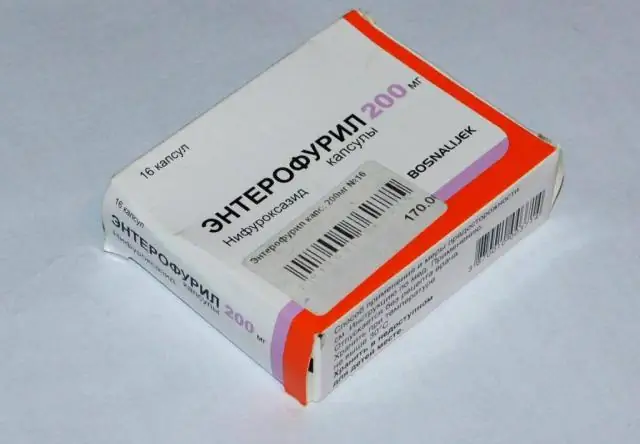- Author Rachel Wainwright wainwright@abchealthonline.com.
- Public 2023-12-15 07:39.
- Last modified 2025-11-02 20:14.
Imunorix
Imunorix: instructions for use and reviews
- 1. Release form and composition
- 2. Pharmacological properties
- 3. Indications for use
- 4. Contraindications
- 5. Method of application and dosage
- 6. Side effects
- 7. Overdose
- 8. Special instructions
- 9. Application during pregnancy and lactation
- 10. Use in childhood
- 11. In case of impaired renal function
- 12. For violations of liver function
- 13. Use in the elderly
- 14. Drug interactions
- 15. Analogs
- 16. Terms and conditions of storage
- 17. Terms of dispensing from pharmacies
- 18. Reviews
- 19. Price in pharmacies
Latin name: Imunorix
ATX code: L03AX05
Active ingredient: Pidotimod (Pidotimod)
Producer: Doppel Farmaceutici (Italy)
Description and photo update: 18.10.2018
Prices in pharmacies: from 774 rubles.
Buy

Imunorix is an immunostimulating agent.
Release form and composition
Dosage form - oral solution: transparent red-violet liquid with the smell of wild berries (7 ml each in transparent glass bottles equipped with a first opening control, in a cardboard box of 10 bottles).
The composition of the solution in 1 bottle:
- active substance: pidotimod - 400 mg;
- auxiliary components: sodium propyl parahydroxybenzoate, edetate disodium, sodium methyl parahydroxybenzoate, sodium saccharinate, sorbitol 70%, trometamol qs, sodium chloride, purified water, Ponso 4R crimson dye, anthocyanin dye, fruit flavor (with the smell of wild berries).
Pharmacological properties
Pharmacodynamics
Pidotimod is an immunotropic substance of peptide structure that stimulates and regulates cellular immunity.
In case of insufficiency of immunocompetent T-lymphocytes, which act as coordinators of specific immunity in physiological conditions, pidotimod promotes their maturation and formation.
The substance also stimulates macrophages, the main function of which is to capture the antigen and its presentation on the cell membrane in combination with histocompatibility antigens. The ability of the human body to resist infectious agents is expressed in effective specific cellular, immune and antigen-antibody protective responses.
The therapeutic effect of pidotimod lies in the immunostimulating effect on cellular and innate immunity, the production of antibodies and cytokines.
The drug increases the cytotoxic activity of natural killer cells, increases the production of superoxide anions, NO (bactericidal effect), tumor necrosis factor-α, as well as chemotaxis and phagocytosis.
Imunorix prevents the development of apoptosis induced by 12-O-tetradecanoylphorbol-13-acetate, calcium ionophore A-23187 and dexamethasone, increases the stimulation of the antigen-antibody reaction, enhances the functional activity of T and B lymphocytes.
In the spleen of rats, the drug increases the expression of the interleukin-2 gene, in old rats - its content. In particular, it was found that pidotimod has an immunostimulating effect, especially when the immune system is deficient and when it functions at the physiological level.
Pharmacokinetics
Pidotimod is characterized by high absorption after oral administration. Its bioavailability is 45%. The drug is excreted completely in the urine unchanged. The half-life is 4 hours.
The degree and rate of absorption of the active substance of Imunorix are significantly reduced with simultaneous intake of food. Compared to taking on an empty stomach, the bioavailability of the drug taken with food is reduced to 50%, while the maximum serum concentration is reached 2 hours later.
In renal failure, the half-life of pidotimod increases, but does not exceed 8-9 hours, even with severe renal failure (in the case of creatinine in the blood plasma 5 mg / dL). Since the intervals between doses of the drug are 12 or 24 hours, there is no risk of accumulation of the substance in patients with renal insufficiency.
Studies on the use of pidotimod in patients with hepatic insufficiency have not been conducted, since the substance is almost completely excreted in the urine unchanged.
Pharmacokinetic studies on the use of the drug in elderly patients did not reveal any differences from the pharmacokinetics in middle-aged people.
Indications for use
- infections of the urinary tract, upper and lower respiratory tract - as an immunostimulant for violations in the cellular link of immunity;
- prevention of exacerbations and reduction of the duration and severity of individual episodes, as well as an adjuvant in the antibiotic therapy of acute infections.
Contraindications
- children under 3 years old;
- intolerance to fructose;
- hypersensitivity to any component of the drug.
Carefully:
- hyperimmunoglobulinemia syndrome E;
- atopy or allergic reactions in history.
Instructions for use of Imunorix: method and dosage
The solution should be taken orally between meals, optimally 2 hours before or 2 hours after meals.
Doses for adults:
- acute phase: 2 bottles (800 mg) 2 times a day for a course of 2 weeks, then - in a maintenance dose of 800 mg once a day for 60 days;
- prevention: 800 mg 1 time per day for 60 days.
Doses of Imunorix for children from 3 years old:
- acute phase: 1 bottle (400 mg) 2 times a day for 2 weeks, then - in a maintenance dose of 400 mg 1 time per day for 60 days;
- prevention: 400 mg 1 time per day for 60 days.
Side effects
According to clinical studies, the incidence of a few side effects (pain and burning sensation in the stomach) is comparable to that in the placebo groups. These events were presumably associated with concomitant antibiotic therapy.
Possible side effects:
- from the gastrointestinal tract: very rarely (<1/10 000) - nausea, abdominal pain, diarrhea;
- on the part of the skin and subcutaneous tissues: very rarely - allergic dermatitis, including skin rashes, hives, itching, swelling of the lips;
- on the part of the immune system: there is one known case (out of 1 million patients who received the drug) of uveitis and one case of Schönlein-Genoch syndrome.
Overdose
There have been no reports of overdose or misuse of Imunorix. There is no information on the specific treatment of overdose. In such situations, you should immediately consult a doctor. Adequate symptomatic and supportive therapy is required. Patients should be monitored until complete recovery.
special instructions
No information available.
Influence on the ability to drive vehicles and complex mechanisms
According to the instructions, Imunorix does not have any effect on the psychomotor and cognitive functions of a person.
Application during pregnancy and lactation
Animal studies have not revealed any direct or indirect adverse effects on reproductive function, however, the experience of using the drug in pregnant women is very limited, therefore it is not recommended to take Imunorix in the first trimester of pregnancy.
It is not known whether pidotimod penetrates into breast milk. During treatment, women are advised to stop breastfeeding.
Pediatric use
For children, Imunorix can be used from 3 years of age.
With impaired renal function
With renal failure, the half-life of the drug from the body increases, but there is no risk of cumulation, so there is no need to adjust the dose of pidotimod.
For violations of liver function
A special dosage regimen of the drug is not required.
Use in the elderly
A special dosage regimen of the drug is not required.
Drug interactions
Pidotimod does not bind to plasma proteins and is not metabolized, therefore pharmacokinetic interactions are not expected.
Imunorix can affect the effectiveness of drugs that affect the activity of the immune system, suppress or stimulate the functional activity of lymphocytes.
In animal studies in which pidotimod was used concomitantly with other widely used drugs, no adverse interaction reactions were detected. These drugs include: diuretics (chlorothiazide), antiepileptic drugs (phenobarbital), nonsteroidal anti-inflammatory drugs (indomethacin), anticoagulants (warfarin), as well as hypoglycemic (tolbutamide), antihypertensive (captopril, nifed and paracetamol), atenoliphenol (acetylsalicylic acid) means.
Analogs
Imunorix analogs are: Imunoplus (tablets), Immunal (drops for oral administration), Immunotone (syrup for internal use), Immunomax (lyophilic powder for the preparation of intramuscular injections).
Terms and conditions of storage
Keep out of reach of children at temperatures up to 30 ° C.
The shelf life is 3 years.
Terms of dispensing from pharmacies
Dispensed by prescription.
Reviews about Imunorix
Imunorix is much more expensive than its counterparts, but it definitely wins in terms of efficiency. Doctors testify to the positive dynamics of drug use, note a significant increase in the immune response and resistance to pathological microorganisms, including bacteria, fungi and even viruses.
According to reviews, Imunorix gives good results in diseases of the urinary tract. When used in venereal disease departments, the drug can shorten the course of therapy several times.
Parents note the strengthening of the immunity of their children during the prevention of morbidity in the winter-spring period: there is resistance to respiratory diseases, an increase in working capacity during school.
Price for Imunorix in pharmacies
The price of Imunorix is 760-1220 rubles per package, which includes 10 vials of 7 ml of the drug.
Imunorix: prices in online pharmacies
|
Drug name Price Pharmacy |
|
Imunorix 400 mg oral solution 7 ml 10 pcs. 774 RUB Buy |
|
Imunorix solution for internal approx. 400mg 7ml 10 pcs. 898 RUB Buy |

Maria Kulkes Medical journalist About the author
Education: First Moscow State Medical University named after I. M. Sechenov, specialty "General Medicine".
Information about the drug is generalized, provided for informational purposes only and does not replace the official instructions. Self-medication is hazardous to health!






